Kidney transplantation is the only treatment of choice for end-stage kidney disease. Successful kidney transplantation may offer better quality of life and longer patient survival compared with dialysis. Life after successful kidney transplantation is much better when compared to dialysis. There are also many things you should consider in your life after transplant that involve taking care of your new kidney.
Diet and exercise
Kidney transplant recipients are advised to consume a healthy diet. Consumption of dairy products, meat, fish, eggs, beans and other non-dairy sources of protein is also important. Fats and sugars should be taken in moderation, whereas salts should be avoided as much as possible, as salty food can raise blood pressure. They will be able to start a exercise routine about 6 weeks after surgery. Exercise helps to improve the heart and lung health, prevent weight gain and even improve mood. Talk to your doctor about the types of exercise that are right for you.
Stop smoking
Kidney transplant recipients should quit smoking even before the transplant surgery. Patients who continue to smoke after receiving a kidney transplant will be at high risk of suffering from heart attacks and stroke.
Kidney rejection
Having a new kidney is a major change for your body. Though most kidney transplants are successful, there are some cases in which kidney transplant is not successful. There are various reasons, why all transplants are not successful and one of the causes is rejection. This can happen if your body’s immune system recognizes the kidney as foreign. To prevent this from happening, doctor will give you immunosuppressants, also referred to as anti-rejection drugs. These medicines decrease your immune response so your body is less likely to reject your new kidney.
There are two types of kidney rejections:
1. Acute rejection usually happens within the first one to three months after transplantation However, less than one in 20 transplant patients have acute rejection that leads to complete failure of the new kidney.
2. Chronic rejection happens slowly over time after transplantation as body continues to fight the new kidney.
Signs and symptoms of kidney rejection
• Urinating less than usual
• Ankle swelling
• Pain or tenderness over the area where your transplant was done
Rise in your creatinine levels
You will need a kidney biopsy to be done to confirm rejection.
If the doctor tells you, the body might be rejecting your kidney transplant, it does not mean your new kidney is failing. Sometimes, changing the dosage or addition of new medication will correct this issue. That’s why it’s important to take your immunosuppression medication as prescribed.
Avoid infections
People on immune-suppressants are prone to infections as they are immunocompromised. Good personal hygiene should be inculcated. Avoid being in contact with people in your home if they are sick. Drink plenty of water to stay hydrated. Don’t visit places with large crowds such as malls, restaurants, or movies. Wear your face mask at all times when you step out of your house. People around you should be advised to cover their mouth when they cough or sneeze. Don’t share personal items such as towels, washcloths, toothbrushes, etc. Do not share food or drinks with others and always have hot cooked food.
Work
If you are planning on going to work, doctor may advise you to wait for three to six weeks after the surgery and will help you decide what is best for you.
Travel
Travel within the first three months after transplant is not recommended. Doctor may also suggest you to wait 6 to 12 months before traveling abroad. Thereafter, if you are traveling to a country, please consult your physician regarding vaccinations and also take advise about the precautions that you need to take when on holidays.
Driving
You can start driving 6 weeks after your transplant. The reason for the delay is that some of the medicines you have to take right after transplant can cause tremors and vision changes. When you start driving again, it may be smart to have someone ride with you.
Sex life
After having a kidney transplant, the doctor may ask you not have sex for 4 to 6 weeks after your transplant, or until your surgical wound is completely healed.
For women who had a kidney transplant, you may now find that your menstrual periods are more regular, and as part of this you may be more likely to become pregnant. You need to avoid getting pregnant until one year after your transplant.
If planning a pregnancy, after an year it is important that you discuss with doctors, about potential risks to make the right decisions for you and your family.
Transplantation is a life-altering procedure. Choose Bright kidney center as it is the best kidney specialist hospital in Hyderabad. Visit the doctor or book an appointment and get the best treatment from kidney specialist.

Leave a Reply